Dealing with crawling ants in your home can be nerve-racking. Now imagine living with those creepy pests with wings flying around your kitchen or some few flying ants in bathroom. That will be a hell of an experience. That’s why you need to learn how to get rid of ants with wings to make the extermination process easier.
Through my 25 years of studying the control of these pests, I have acquired skills and expertise, and I can help you with the best strategies on how to kill flying ants.
Learn more about these pests and things that cause flying ants in your house, as well as the best way to kill them.
[wpsm_titlebox title=”How to Get Rid of Flying Ants” style=”main”]
- Find the nest of flying ants. Get rid of flying ants as soon as you notice them.
- Use baits, sprays, Zappers, flying ant insecticides.
- Use natural remedies: dishwashing detergent, natural peppermint, use sticky tape, create a trap of borax and sugar.
[/wpsm_titlebox]
What Are Flying Ants and How They Look?
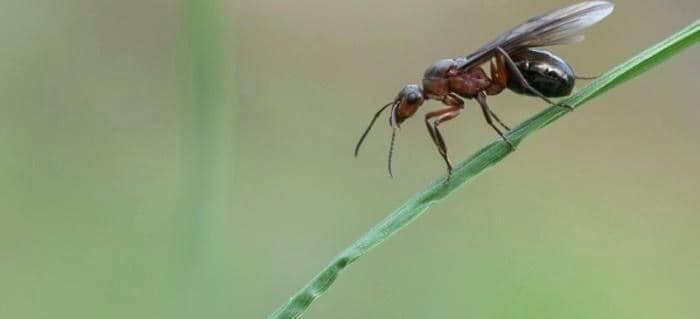
The flying ants you see are not a unique species. They are members of different ant species like carpenter ants, fire ants, sugar ants, and many others that develop wings when they are ready to mate.
Such ants are regarded as the reproductive members of the colony. Every ant species usually have the flying members who come out for a brief period to mate and increase their population.
The flying ants are usually made of males (drones) and females (queen). After mating, the males die while the females lose their wings and look for nests to start a new generation. It’s common to see flying ants swarming in thousands because colonies send out many flying ants at one go.
This is because only a small number out of these will survive the mating stage and start a new generation. The majority of them are eaten by predators like birds, while some end up dying from lack of food and water.
So what do flying ants look like? Well, most people confuse flying ants with termites due to their size and wings. But identifying flying ants shouldn’t be hard for you. Winged ants have a pinched body between the thorax and the abdomen, whereas termites have a straight-sided body.
Also, ants have four wings with unequal lengths with the two front wings being longer and the two back wings being shorter. The termites’ wings, on the other hand, are of equal length.
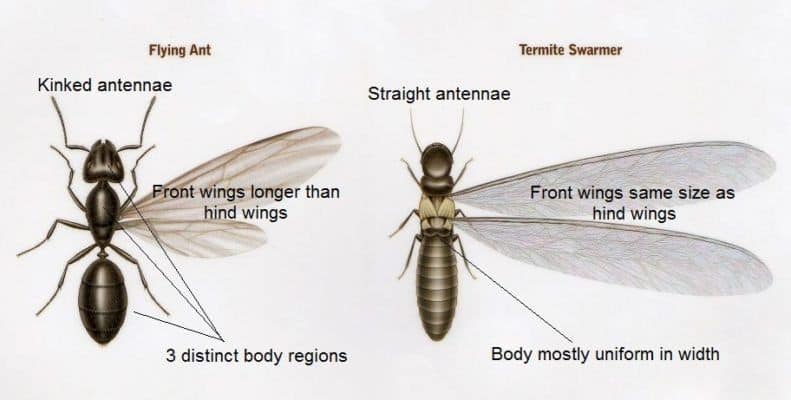
How Long Do Flying Ants Live?
The queen and the male ants are the only flying ants in a colony. The queen can live for more than ten years. Male ants, on the other hand, die shortly after mating with the queen, which is usually a day or two after the nuptial flight.
Do Flying Ants Bite?
Flying ants are relatively harmless, and they are usually interested in looking for a place to nest. As a result, they are highly unlikely to bite people.
It has been reported that some flying ants do bite or sting. These are, however, sporadic occurrences. Besides, the bits are not harmful.
What Causes Flying Ants?
Winged ants can be seen during the hot, humid weather. It’s possible to encounter these ants outdoors or even inside your house. If you notice flying ants at home, especially during the winter, it could mean there is an ant colony in your house that wants to expand. Shelter, food, and water are mostly what attracts flying ants to your home during the cold months. However, their primary goal is always to mate.
If that’s the first time you see an ant in your home or if it is during the summer, there is a likelihood the winged ant must have gotten in through an open door or window. Whatever the case, make sure you exterminate your home to prevent the winged ant from building a colony in your house.
It’s common to see swarming ants outside during the hot, humid weather. This is the time when flying insects seek to build new colonies. Make sure you prevent any flying ants infestation near your home, because if they manage to build a settlement there, they may end up damaging your property.
So do you know how to kill flying ants outside and prevent an infestation? Well, the best way to go about it is to find the nest and eradicate it. You may also have to spray bug barriers for maximum protection.

Can Flying Ants Do Damage?
Flying ants can cause substantial structural damage. Carpenter ants are the most destructive species. They punch holes in the wooden foundation of your home to create a colony. These harmful pests can burrow through the wood to make tunnels, a situation that can get ugly if they attack your furniture. In addition, if they manage to build a colony, you may have a bigger problem to deal with.
I advise you to start treating flying ants immediately you spot one. This is the best way to prevent a massive infestation as you may end up killing a queen who is about to build a colony and start a new generation in your home.
How to Get Rid of Flying Ants
While ants with wings are harmless, they can be a nuisance. Getting rid of flying ants should be a priority. There are many ways to kill these pests. In this section, I will discuss the main flying ant treatments as well as natural methods to kill ants that are readily available at home.
Main Methods
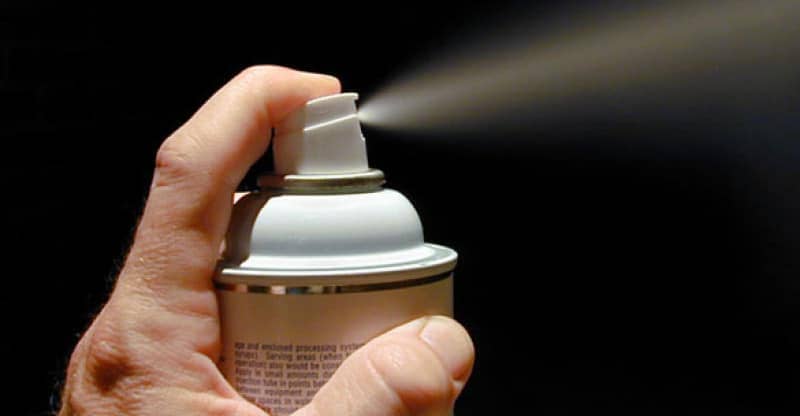
These methods are the most effective in killing flying ants. The following are some of the main techniques you can use in your home.
Baits and Traps – Best Flying Ant Treatment
[amazon box=”B00E4GACB8″ template=”vertical” tracking_id=”how-to-get-rid-of-flying-ants-20″ button_text=”Check price on Amazon”]
Specifications:
- Style: Liquid Bait
- Item Weight: 4.3 ounces
- Number of Pieces: 12
- Item Dimensions LxWxH: 1.2 x 6.6 x 4.5 inches
- Target Species: Ants
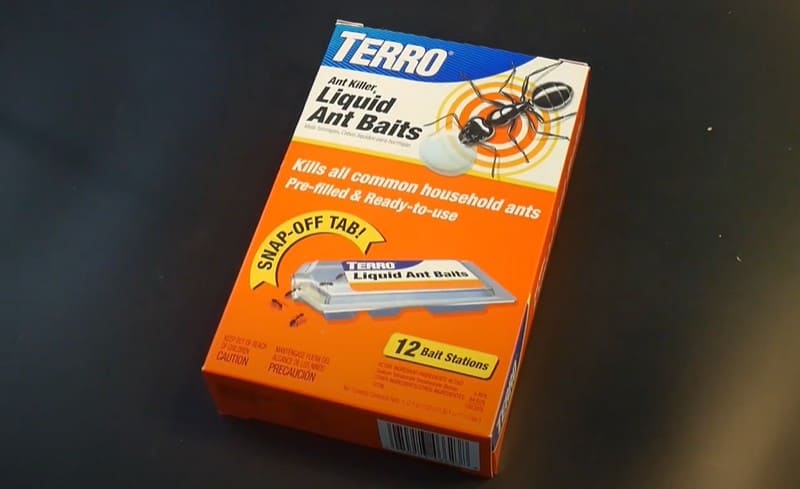
Baits are slow killing but extremely effective methods of getting rid of flying ants in the house. When ants pick up the poison bait, they transfer it to the colony. As soon as the queen eats the poison, it dies, and since carpenter ants cannot survive without the queen, the entire colony is eliminated eventually.
Also, ants usually make a beeline for sugary food, and other ants follow the bee-line to the source of food. This is what makes bait an effective flying ant killer.
Check out my review of the top ant baits and traps on the market.
Sprays
Sprays are more toxic methods of killing flying ants inside house. These commercial insecticidal sprays kill the winged ants on contact. For the most part, sprays work best when you are dealing with a few flying ants. This is because this method can only kill one pest at a time unless you are using the sprays that leave behind a residual effect.
Flying ant sprays with residual effects are better applied around the perimeter of your home. This will kill the ants before they get into your home.
Check out my review of the most effective ant sprays.
Zappers
Zappers can be mounted both indoors and outdoors. These electronic devices produce very bright light to attract insects and then kill them using an electric grid. Some bug zappers also contain chemicals that kill the ants. If you are buying zappers to mount outside the house, I recommend purchasing the waterproof zappers to keep them protected from the rain.
Here I’ve also reviewed the best bug zappers that work.
Insecticides
Insecticides are effective flying ants treatment provided they are labeled for use against ants. There are different classes of insecticides, depending on how they affect the insect. Some kill on contact while others are incorporated in plants and kill the insect when it ingests the chemical found in the insecticide.
Insecticides can be toxic, so it’s essential to follow all the instructions on the labels to avoid misusing them. Failure to do so can harm humans and pets.
Natural Remedies
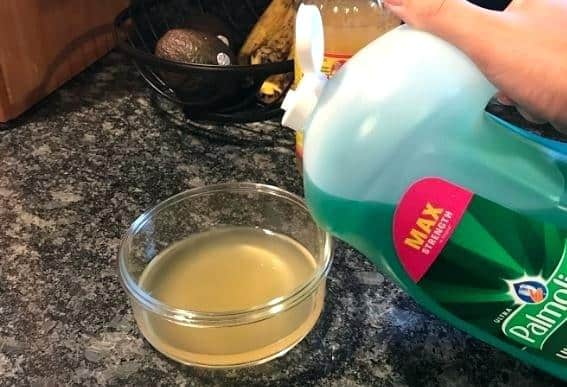
Natural ways of killing flying ants are usually non-toxic and keep your family members as well as pests safe. They are also less expensive compared to the main methods of ant extermination. However, natural remedies are not as effective in killing winged ants as other methods like zappers and insecticides. Read on to find out top hacks on how to get rid of winged ants using some standard natural methods.
Dish Soap
It only requires adding dishwashing soap to the water to make this spray for flying ants. Dishwashing soap usually sticks on the body of the ants and dehydrates it, killing it in the process. All you need to make this spray is dish soap, water, and a spray bottle. The good thing about this spray is that it’s non-toxic and can be used anywhere in the house without worrying about your children or pets.

Natural Peppermint
Natural peppermint makes a good spray for ants with wings. Peppermint oil works by suffocating the ants to death. The spray will work better when you mix peppermint oil with dishwashing soap and water.
Add a few drops of natural peppermint oil with water and liquid dish soap and mix thoroughly.
Use Tape to Trap the Ants
Sticky tapes also make good flying ant traps. The tapes should be placed near surfaces where these ants land to feed. Also, since flying ants like to hover around sources of lights, putting the sticky tapes near bulbs, lanterns or lamps can help you catch most of these ants.
Create a Trap Using Borax and Sugar
Borax is toxic to ants. So, you can create flying ant bait using borax and sugar. By mixing the borax with sweet-smelling sugary bait, the ants will not notice the borax. As a result, they carry it to the colony for every ant to feed. Once they feed on the borax, the queen, together with the worker ants die.
To make this trap work, make a paste of borax and sugar and place it in the infested area. This trap can be used inside the house or outside. However, ensure the borax is kept away from pets and children as it can be toxic in high dosage.
Concluding Thoughts
You can easily kill flying ants. However, the problem will not be over if you don’t destroy the colony. I advise people to identify the nest and use their preferred method of killing the flying ants. If you can find the underlying cause of the problem by killing the queen, then flying ants’ infestation will never be a problem for you. It’s important to use different ant killing products to get the desired result in a short period.
Have you ever experienced flying ant infestation? How do you kill flying ants? Is there any other method that works best besides the mentioned ones above? Let me know in the comments section.
Also read:
References:
- How to Identify a Queen Ant (wikiNow):
https://www.wikihow.com/Identify-a-Queen-Ant - Insects in the City (Texas AgriLife):
https://citybugs.tamu.edu/factsheets/landscape/ants/ent-2012/ - How to keep flying ants away, do they bite, and how long do they live for? (Metro):
https://metro.co.uk/2018/07/05/keep-flying-ants-away-long-live-7685444/ - How Insecticides Work (Living History Farm): https://livinghistoryfarm.org/farminginthe70s/pests_06.html

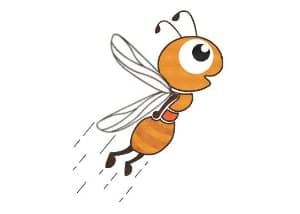
Comments are closed.